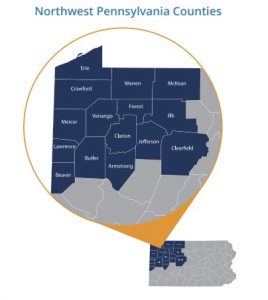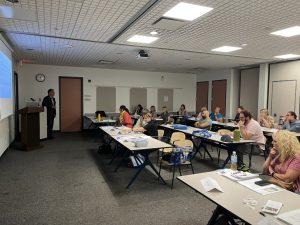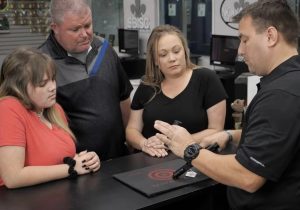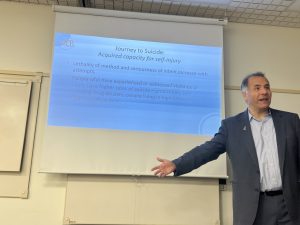Suicide Prevention Training in Traditional and Nontraditional Settings
 The Northwest Pennsylvania (NW PA) Veteran Suicide Prevention Program operates on a three-pronged approach involving healthcare providers, community organizations, and Veterans and their families in the 15 counties of NW PA.
The Northwest Pennsylvania (NW PA) Veteran Suicide Prevention Program operates on a three-pronged approach involving healthcare providers, community organizations, and Veterans and their families in the 15 counties of NW PA.
This article includes some frequently asked questions about suicide prevention and delivering QPR (Question. Persuade. Refer.) and ASIST (Applied Suicide Intervention Skills Training). Compiled with the help of program implementation specialist Lee Wagner, we hope this information helps spread the word to potential healthcare sites, businesses, and community organizations that may be interested in collaborating with us.
Read time: 5 minutes
We encourage everyone to share this information with people in your network.
Frequently Asked Questions About Our Training Opportunities
Where can suicide prevention training be offered?
 A key goal of our program is to address suicide risk factors and the stigma associated with risk factors by working with both traditional and nontraditional partners likely to interact with individuals in crisis. As many suicide deaths are firearm-related, we must educate and involve stakeholders from the medical and behavioral healthcare community and the firearms community. The training can be held anywhere, such as a community center, a firing range or gun shop, a church, a medical or behavioral health practice, or whatever is most convenient.
A key goal of our program is to address suicide risk factors and the stigma associated with risk factors by working with both traditional and nontraditional partners likely to interact with individuals in crisis. As many suicide deaths are firearm-related, we must educate and involve stakeholders from the medical and behavioral healthcare community and the firearms community. The training can be held anywhere, such as a community center, a firing range or gun shop, a church, a medical or behavioral health practice, or whatever is most convenient.
What is meant by “the firearms community”?
 In Northwest Pennsylvania, the firearms community includes Veterans, gun shops and retailers that sell firearms and their customers, shooting range owners and members, hunting clubs, firearm collectors, and those who own firearms for personal or family safety. QPR and ASIST training helps everyone learn how to talk about a subject that is often considered taboo. There are so many Vets in rural Pennsylvania, and these clubs and businesses are an important part of their community. We want to offer suicide prevention training in places where people who own firearms socialize and feel comfortable, and we want to provide the training on days and times that are convenient to them.
In Northwest Pennsylvania, the firearms community includes Veterans, gun shops and retailers that sell firearms and their customers, shooting range owners and members, hunting clubs, firearm collectors, and those who own firearms for personal or family safety. QPR and ASIST training helps everyone learn how to talk about a subject that is often considered taboo. There are so many Vets in rural Pennsylvania, and these clubs and businesses are an important part of their community. We want to offer suicide prevention training in places where people who own firearms socialize and feel comfortable, and we want to provide the training on days and times that are convenient to them.
Is teaching about gun safety part of suicide prevention training?
 Providing instruction about gun safety, gun locks, and safe storage is not part of our suicide prevention training, but it is something offered by many of our partners in the firearms community. When we go into any community to conduct training, we’re there to talk about suicide with firearms and how to get Veterans and families the help they need.
Providing instruction about gun safety, gun locks, and safe storage is not part of our suicide prevention training, but it is something offered by many of our partners in the firearms community. When we go into any community to conduct training, we’re there to talk about suicide with firearms and how to get Veterans and families the help they need.
Why should a business or community group request suicide prevention training?
 Many people in Northwestern Pennsylvania are painfully and personally connected to suicide. Training such as QPR is ideal for anyone. You don’t have to be a healthcare professional or social worker. You can be a coach, a neighbor, a family member, a pastor, or a friend. One of our program’s big advantages is that we’re small and immediately responsive. We can quickly and easily connect with communities in ways that large organizations cannot. Everyone on the program implementation team is a Veteran certified to teach QPR, and we’re all very familiar with military culture, the firearms community, and the region.
Many people in Northwestern Pennsylvania are painfully and personally connected to suicide. Training such as QPR is ideal for anyone. You don’t have to be a healthcare professional or social worker. You can be a coach, a neighbor, a family member, a pastor, or a friend. One of our program’s big advantages is that we’re small and immediately responsive. We can quickly and easily connect with communities in ways that large organizations cannot. Everyone on the program implementation team is a Veteran certified to teach QPR, and we’re all very familiar with military culture, the firearms community, and the region.
How can a business or community group request suicide prevention training?
Contact us at nwpaveteran@pitt.edu or by using the contact form on this website. Our goal is to save lives in the Veteran community, and it’s important to have our programs where they can have the biggest impact.
Looking to Get Involved?
 Whether you identify as a healthcare provider, community organization, or Veteran, there are several opportunities through the NW PA Veteran Suicide Prevention Program and PERU to connect to resources, participate in educational training, and promote harm reduction strategies. We are actively recruiting healthcare and community partners to work with us in meeting our goals and objectives. To learn more, visit the program website at theresilientveteran.org.
Whether you identify as a healthcare provider, community organization, or Veteran, there are several opportunities through the NW PA Veteran Suicide Prevention Program and PERU to connect to resources, participate in educational training, and promote harm reduction strategies. We are actively recruiting healthcare and community partners to work with us in meeting our goals and objectives. To learn more, visit the program website at theresilientveteran.org.
Need Help? Know Someone Who Does? Contact the National Suicide Prevention Lifeline at 988 or use the online Lifeline Crisis Chat. Both are free and confidential. You’ll be connected to a skilled, trained counselor in your area.

